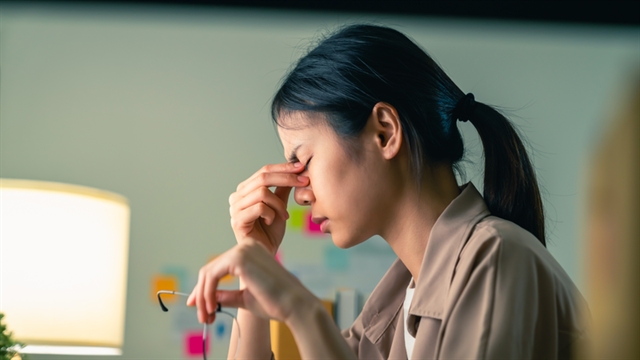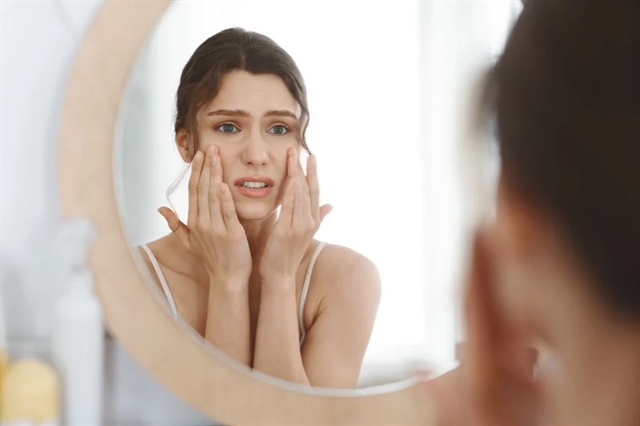Dr. Snigdha Singh
Stress, the silent saboteur, leaves its mark not just on our minds but also visibly on our skin. From breakouts, rashes and hair loss to premature aging, the skin often serves as a canvas displaying the turmoil happening beneath the surface. Understanding this connection and finding effective ways to manage stress is crucial for maintaining both mental well-being and a healthy complexion.
 |
| Stress, the silent saboteur, leaves its mark not just on our minds but also visibly on our skin. — Photo shutterstock,com |
The Skin-Stress Connection
The skin, being the largest organ of the body, is intricately connected to our emotional and physical health. When we experience stress, our bodies release cortisol, a hormone that can wreak havoc on the skin. It also triggers release of Adrenaline, inflammatory markers and neuropeptides that can lead to various skin issues, including:
Acne: Stress increases oil production, which can clog pores and lead to breakouts.
Psoriasis, Eczema and Rosacea: Chronic stress can dysregulate the immune system, leading to an increase in inflammatory markers causing flare-ups of such conditions.
Delayed Healing: Stress impairs the skin’s ability to repair itself, slowing down the healing process of wounds and increasing susceptibility to infections.
Hives: Acute stress can cause hives or urticaria through the release of histamines and neuropeptides.
Accelerated Aging: Stress generates free radicals, unstable molecules that can damage skin cells. This accelerates the aging process, resulting in wrinkles, loss of elasticity and dull skin.
Nervous behaviours: Stress can trigger excessive sweating, involuntary habits like scratching, picking or rubbing which can lead to breakouts, hyperpigmentation, scarring or infections.
Hair loss or thinning: Telogen effluvium is a form of stress induced hair loss which can lead to noticeable thinning of hair.
Dark circles and puffiness under eyes: Result of lack of sleep due to stress.
 |
| The skin, being the largest organ of the body, is intricately connected to our emotional and physical health. Photo shutterstock,com |
Managing Stress for Healthier Skin
Understanding the biological impacts of stress on the skin underscores the importance of stress management in daily routines.
Jacobson’s Deep Muscle Relaxation Technique: By lowering cortisol levels, this technique helps minimise the impact of stress-induced skin problems. Additionally, it promotes better sleep, reduces anxiety and enhances overall well-being.
1) Sit or lie down in a comfortable position in a quiet environment where you won’t be disturbed.
2) Take slow, deep breaths to help your body start to relax.
3) Tense each muscle group for about five seconds and then relax for 15-20 seconds. Begin with your feet and gradually move upwards through your body. (Feet–>Calves–>Thighs–>Abdomen–>Hands–>Arms–>Shoulders–>Face)
4) Pay attention to the difference in sensation between tension and relaxation.
5) Once you have worked through all muscle groups, take a few more deep breaths and enjoy the feeling of relaxation throughout your body.
Mindfulness meditation: Start by meditating 3-5 minutes before bedtime and increase up to 20-30 minutes.
Lie down in a quiet space–>Close your eyes–>Inhale and exhale deeply and just focus on your breathing–>If a thought pops up, let it go and refocus.
Regular physical activity: Yoga, Tai chi or any physical activity/sports you enjoy doing, pumps up your endorphins and acts as a stress reliever. Various asanas in yoga help reduce hair loss as well.
Consistent Skincare regimen: Regular skin care routine according to your skin type supports the skin barrier and can help manage stress-related skin issues.
Lifestyle Changes: Drinking plenty of water, getting adequate sleep and eating a healthy, balanced diet rich in antioxidants, omega-3 fatty acids and vitamins can improve skin health. It is also important to limit alcohol and caffeine which can worsen stress and affect sleep. Smoking can also worsen skin health and accelerate skin aging.
Expert Advice: If stress is overwhelming, causing harmful behaviours, consider speaking to a mental health professional. In case of flare-ups of pre-existing skin conditions, seek help from a dermatologist.
The effects of stress on the skin are undeniable, but with mindful practices and positive lifestyle changes, we can combat these negative impacts. Taking time each day to relax and de-stress not only benefits your mental health but also keeps your skin looking its best. Remember, a calm mind leads to a glowing complexion, so embrace relaxation and let your skin reflect your inner peace. Family Medical Practice
* Dr. Snigdha Singh studied a Bachelor of Medicine and Surgery and has a masters in Dermatology
She specialises in diagnosing and treating a wide variety of skin disorders for both adults and children
She can also advise on numerous skin cosmetic conditions and treating benign skin disorders by RF cautery, cryosurgery and minor surgery as indicated
Visit Family Medical Practice Hanoi 24/7 at 298I Kim Mã, Kim Mã Ward, Ba Đình District. To book an appointment, please call us at (024) 3843 0784, or contact us via Whatsapp, Viber or Zalo on +84 944 43 1919 or email [email protected].
FMP’s downtown location in Hồ Chí Minh is in Diamond Plaza, 34 Lê Duẩn Street, Bến Nghé, District 1, and 95 Thảo Điền Street, District 2. Tel. (028) 3822 7848 or email [email protected].
- Reduce Hair Loss with PURA D’OR Gold Label Shampoo
- Castor Oil Has Made a “Huge” Difference With Hair and Brow Growth
- Excessive hair loss in men: Signs of illness that cannot be subjective
- Dịch Vụ SEO Website ở Los Angeles, CA: đưa trang web doanh nghiệp bạn lên top Google
- Nails Salon Sierra Madre
 VnExpress News The News Gateway of Vietnam
VnExpress News The News Gateway of Vietnam





